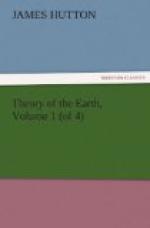The formation of a future earth being in the bottom of the ocean, at depths unfathomable to man, and in regions far beyond the reach of his observation, here is a part of the process which cannot be taken as a principle in forming an estimate of the whole. But, in the destruction of the present earth, we have a process that is performed within the limits of our observation; therefore, in knowing the measure of this operation, we shall find the means of calculating what had passed on a former occasion, as well as what will happen in the composition of a future earth. Let us, therefore, now attempt to make this estimate of time and labour.
The highest mountain may be levelled with the plain from whence it springs, without the loss of real territory in the land; but when the ocean makes encroachment on the basis of our earth, the mountain, unsupported, tumbles with its weight; and with the accession of hard bodies, moveable with the agitation of the waves, gives to the sea the power of undermining farther and farther into the solid basis of our land. This is the operation which is to be measured; this is the mean proportional by which we are to estimate the age of worlds that have terminated, and the duration of those that are but beginning.
But how shall we measure the decrease of our land? Every revolution of the globe wears away some part of some rock upon some coast; but the quantity of that decrease, in that measured time, is not a measurable thing. Instead of a revolution of the globe, let us take an age. The age of man does no more in this estimate than a single year. He sees, that the natural course of things is to wear away the coast, with the attrition of the sand and stones upon the shore; but he cannot find a measure for this quantity which shall correspond to time, in order to form an estimate of the rate of this decrease.
But man is not confined to what he sees; he has the experience of former men. Let us then go to the Romans and the Greeks in search of a measure of our coasts, which we may compare with the present state of things. Here, again, we are disappointed; their descriptions of the shores of Greece and of Italy, and their works upon the coast, either give no measure of a decrease, or are not accurate enough for such a purpose.
It is in vain to attempt to measure a quantity which escapes our notice, and which history cannot ascertain; and we might just as well attempt to measure the distance of the stars without a parallax, as to calculate the destruction of the solid land without a measure corresponding to the whole.
The description which Polybius has given of the Pontus Euxinus, with the two opposite Bosphori, the Meotis, the Propontis, and the Port of Byzantium, are as applicable to the present state of things as they were at the writing of that history. The filling up of the bed of the Meotis, an event which, to Polybius, appeared not far off, must also be considered as removed to a very distant period, though the causes still continue to operate as before.




